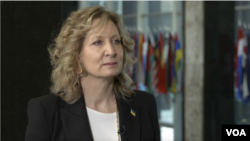In the two years since Russia invaded Ukraine, Ukrainian authorities say they have documented more than 125,000 war crimes committed by Russian forces. And in 2023, the International Criminal Court issued an arrest warrant for Russian President Vladimir Putin on a war crimes charge involving the alleged deportation and transfer of Ukrainian children to Russia.
U.S. Ambassador-at-Large for Global Criminal Justice Beth Van Schaack, in an interview with VOA's Ukrainian Service, says there might be additional ICC arrest warrants to come for Russian leadership, as well as more U.S. court cases involving alleged Russian war crimes committed in Ukraine against American citizens.
The following transcript has been edited for clarity and length.
VOA: Ahead of the second-year anniversary of Russian aggression against Ukraine, Ukrainian authorities documented more than 125,000 war crimes. This is double the number that we saw one year ago. Did this year bring justice any closer?
Van Schaack: Yes, it has. We have now established with the Atrocity Crimes Advisory Group a very solid basis of assistance to the prosecutor general in Ukraine. So those cases are moving forward. We've also seen activity at the International Criminal Court — two arrest warrants for [Russian] President [Vladimir] Putin himself and for Maria Lvova Belova, who's the "children's rights commissioner."
And then finally, we've seen the establishment of the International Center for the Prosecution of Aggression in The Hague. This is a group of prosecutors who are looking to prosecute the crime of aggression, which many in Ukraine call progenitor crime, the original crime that unleashed all of the war crimes and crimes against humanity we've seen since.
VOA: As you noted, the International Criminal Court this year issued an arrest warrant for Russian President Vladimir Putin. And we haven't seen him traveling abroad much. But how much closer is the world to actually arresting Putin and prosecuting him for war crimes?
Van Schaack: We have to understand that these justice processes take time. These cases are complicated. The ICC has no ability to do in-absentia trials, so they need the custody of the accused to proceed with a full adversarial process. But there is much that they can do in the meantime to prepare their cases, prepare their witnesses to give testimony, to collect documents, to work with prosecutors around the world.
We have already seen the impact of these warrants. Putin was invited to attend the BRICS conference in South Africa and the South African judicial system, the civil society, actors, everyone mobilized and made it very clear that South Africa has legal obligations under the Rome Statute. Any ICC member state is under cooperation duties to adhere to the rulings of the ICC and to execute arrest warrants that the court issues.
VOA: Do you expect more arrest warrants against Russian leadership to come?
Van Schaack: We are very aware that this investigation is ongoing in The Hague, in the prosecutor's office. We imagine that they are looking at attacks on civilians, potentially mistreatment of prisoners of war. We have every confidence that there will be additional charges either brought against the original defendants or we may see new defendants emerging and new arrest warrants against additional individuals within the Russian chain of command.
VOA: The U.S. recently started the first investigations of Russian war crimes against American citizens. Why is it important and do you expect more cases like that to come?
Van Schaack: It's a remarkable development. I think it really demonstrates how committed the United States, the Department of Justice and its War Crimes Accountability Team are to doing our part in the larger effort to bring justice for the war crimes and crimes against humanity in Ukraine. I am very hopeful that this is the first of many charges. Now, again, our system is such that we need custody of the accused. Anywhere those individuals will travel, they are vulnerable to being brought into custody and ultimately extradited to the United States to stand justice.
VOA: The United States declared support for the creation of an international tribunal to investigate Russia for its crime of aggression against Ukraine. Did the U.S. and its partners come to a common understanding on this question?
Van Schaack: We're definitely closer to seeing the emergence of this tribunal to prosecute the crime of aggression. The European External Action Service itself has put forward some very creative proposals that try and bridge the gap between the two models that had emerged of a true international tribunal and then more of a hybrid model that would be fully embedded within the Ukrainian system. So, every month, a group of very experienced international criminal lawyers and diplomats are getting together to try and hammer out the finer final details.




